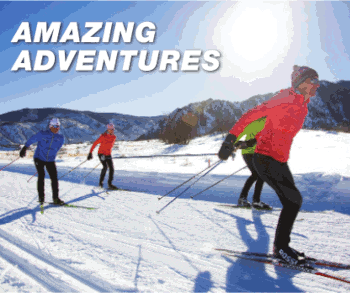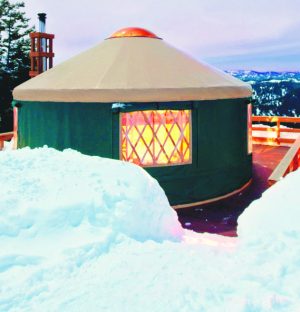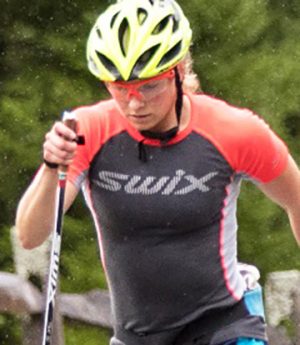March 4, 2008 (BOZEMAN, Mont.) – The University of Colorado ski team arrived here in two waves over the weekend, as the Buffaloes plan on three full days of training ahead of the 55th NCAA Ski Championships which begin here Wednesday and run through Saturday. Colorado is looking for the school’s 18th national title in the sport of skiing, last winning in 2006, the last time the west hosted the event, CU in particular, at Steamboat Springs.
With the Nordic events first, the cross country performers left Friday afternoon and began training Sunday; the alpine contingent left a day later and trained for the first time Monday. All are familiar with the courses, as Colorado won the Rocky Mountain Intercollegiate Ski Association championship on the very same tracks less than two weeks ago.
“It’s springtime, it’s nice outside and we are ready,” head coach Richard Rokos said. “The Nordics are in no question peaking at the right time. The whole thing likely will pop out on the last day when the slalom is run, that’s usually comes down to. Being one guy short is definitely a handicap, but we’ve proved it before that it (winning a title shorthanded) is doable.”
Rokos was referring to the fact that CU qualified 11 of the maximum 12 skiers for this year’s championships; CU became the first and only school win a title shorthanded when the Buffs won in 2006, also short one male alpine skier. Only three schools qualified full teams this winter, the lowest in history, with defending champion Dartmouth, Middlebury and Utah skiing with the maximum. CU and Denver qualified 11, with Alaska-Anchorage and New Mexico sending 10 and Vermont nine. Twenty-two schools overall are participating in Montana this week, but generally those with at least 10 skiers present have a realistic shot at the title.
Colorado is single-minded when it comes to the goal at NCAA’s. “Like we say every year, our goal never changes, it’s always the same, we’re going after the trophy,” Rokos said. “We don’t ever go into this thinking second place would be a great finish. The goal is to win, everybody knows it, and everyone will pursue it. Nordic is solid and predictable. We have no limit on that side, but with alpine, it’s a matter of coming down to falling and in some cases the starting positions. The strategy is to get into top 15 after the first run to start early in the second run.
“So, ski well and have everything on our sideÅ health, strength and clear minds,” he added. Rokos’ teams have won five national championships on his watch at CU, tied for the second most in CU history with current cross country coach Mark Wetmore, and trailing the seven won in skiing under Bill Marolt. Colorado has won 23 overall in its athletic history.
Rokos is a fan of holding the regional at the same western site that hosts the NCAA’s; it’s been done just one other time, back in 2002 in Anchorage.
“This should become a logical strategy for the region, if we can have the regional in the same place, it will help everybody in the region to get familiar with the environment they are going to see just two weeks later. This is a good solution and I would hope in the future we can maintain it. It was invaluable to see the snow conditions on the same courses we will be skiing just 11 or 12 days later.”
CU’s 11-skier roster breaks down by eligibility into five seniors, two juniors, three sophomores and one freshman, though one of the seniors, Maria Grevsgaard, has one year of eligibility remaining and is planning to return next winter. Nine of the 11 skiers have skied previously at nationals, led by senior Lucie Zikova, who will be skiing in her fourth NCAA Championships, with five others appearing for a third time, including Grevsgaard.
Grevsgaard became CU’s all-time leader in individual wins this past winter, as she enters the NCAA’s with 17; Zikova is next on the all-time list with 14, as both passed the previous leader, Nordic performer Per Kare Jakobsen, who won 13 times from 1988 through 1990. Grevsgaard also had four sweeps in meets this winter, giving her the CU career mark of six.
For the second straight year, three Buffaloes earned No. 1 seeds out of the west: Grevsgaard (women’s Nordic), Zikova (women’s alpine) and Kit Richmond (men’s Nordic), while eight in all earned top 10 seeds.
Grevsgaard leads the strongest women’s Nordic team in the west, if not the nation, as her teammates include senior Lenka Palanova, the No. 2 seed, and sophomore Karoline Borgnes (No. 8).
“Lenka had an incredible season,” Rokos said. “She had an up-and-down junior year, we think largely from over training, but in her case she needed to slow down in order to get better. She has been very consistent and with Maria we have a legitimate chance to get two on the podium for one or both races.”
Richmond also heads a tough group of CU men in Nordic; freshman Jesper Ostensen is the No. 7 overall seed, with sophomore Matt Gelso the No. 12 seed. However, Gelso, who earned first-team All-America honors as a frosh, has been sick much of the winter and his just now getting back to 100 percent.
“Matt is coming back from the flu and some issues with his tonsils, so he is finally able to train as hard as he’d like to. We have kind of ‘preserved’ him the last month or so, and hopefully that strategy will prove beneficial,” Rokos said.
Colorado qualified four skiers for each women’s discipline and five men’s Nordic skiers. “There were a couple of tough choices, but it’s a better headache to have than the other way around when you don’t have enough of them qualify,” Rokos explained. “It was hard, especially for me on the woman’s alpine side. (Freshman) Katie Hartman was definitely one who could contend for the podium, but with her being at the junior championships and missing so much school, it would make things really hard for her. On the Nordic side, it was great to see 10 kids qualify, but unfortunately four have to sit out. Like I said, that’s better than coming up short. Jenny (Hamilton) was coming on at the end, but Karoline is a little older and a bit more experienced. So that, too, was hard choice.”
This winter in the west, Colorado, Denver and Utah engaged in a three-team battle from wire-to-wire. The Buffaloes won the opening weekend in Steamboat Springs, the alpine portion of CU’s meet, with the teams heading west to Park City and Soldier Hollow for the Utah’s meet, which the host Utes won by 42½ points, their first win since claiming the 2003 national title. The Nordic events of CU’s meet followed the next weekend in Winter Park, and Colorado would win. Utah grabbed the win at the Western State Invitational, which was marred by too much snow and poor visibility, at least for the alpine skiers. For the third straight year, a meet was finished at a future site, with the WSC meet concluding in Taos, where Denver would eke out the closest competition of the season, posting a 3½ point win over the Buffs. Colorado came back to win the RMISA Championships, posting a 28-point win, though with the coaches playing around with starting positions on the alpine side to either qualify skiers or improve the seeds of those already in, not as much can be taken from regional titles as they used to.
Colorado, which won the RMISA Championships (which also doubled as the NCAA West Regional) by 28 points over Utah, also captured the RMISA season point title with 2,795, though just 72½ more than Denver (2722½). Utah was third with 2641½, but did not send several top skiers to New Mexico that cost it some points.
“Unfortunately, on any given day and of us can be really good or bad,” Rokos said. “We’ve been first, second and third and the same can be said for Denver and Utah. Coming out of regionals with the win gives us some confidence, as it’s always good to be the last one getting the best result.”
Individually, Colorado skiers won 17 of the 42 races in the western regular season, with DU performers winning 11; five schools in all had individual champions, as Utah (8), Nevada (4) and New Mexico (2) also had skiers top the podium. CU’s Grevsgaard won the most titles, nine, including a sweep of the season’s five classical races (she has won 10 of the last 11 times out in classic).
It was a different story in the east; Dartmouth, won five of the six carnivals as Big Green skiers captured 19 of the 48 races en route to winning the eastern crown. Dartmouth ended a run of 12 straight titles by western schools last winter in Attitash, N.H., as Vermont had the east’s previous last title in 1994. UVM is the only eastern to school to win back-to-back titles since the coed format was adopted in 1983, doing so in 1989 and 1990; Middlebury won consecutive women’s titles in 1979-80, the only other time an eastern school has repeated in the sport.
“I think there are many quality teams from the east and the west,” Rokos noted. “Aside from us, Utah, DU, New Mexico and Alaska all have a chance to do well, and from the east, Dartmouth, Middlebury and UVM. New Mexico has a strong alpine team, and having slalom the last day makes things interesting. If they’re in good position heading into the last day, they can factor into it even though they didn’t win or place second during the season. We don’t really know the east schools well, just know of a few things from a far, but Dartmouth seems to have followed up the title with a great year. A great unknown is always how the central cross country teams figure into. Northern Michigan and Alaska-Fairbanks traditionally have powerful teams, and if they inundate the top 10, that will affect the standings.”
The freestyle cross country races open the championships on Wednesday, March 5, with the women’s 5-kilometer event first up at 9:30 a.m. MST, followed by the men’s 10k at 10:30 a.m.; both will take place at the Bohart Ranch Cross Country Center. Alpine takes center stage on Thursday, March 6 at the Bridger Bowl, as the giant slaloms will be run through completion: the men start at 9:30 a.m., followed by the women at 1:00. The classical cross country races will be on Friday, March 7, with the men’s 20k at 9:00 a.m., followed by the women’s 15k at 11:00. The slalom races will finish off the NCAA meet on Saturday, March 8: the first runs are at 9:30 a.m. (women) and 10:30 (men); second runs follow at 11:45 a.m. and 1:00 p.m., respectively.
Top News Stories
CU Skiers Ready For Run At NCAA Championship
release by the University of ColoradoLeave a Reply
You must be logged in to post a comment.






![National camp action [P]...](https://skitrax.com/wp-content/uploads/2019/08/Duluth-4-2019-08-08-at-10.46.51-AM-300x246.png)
![Matt Liebsch on the CXC Elite Team [P] CXC...](https://skitrax.com/wp-content/uploads/2019/08/Matt-Liebsch-CXC.2-525x700.4-300x267.jpg)
![Dan LaBlanc [P]...](https://skitrax.com/wp-content/uploads/2019/08/Dan-LaBlanc-img_1855.3.jpg)
